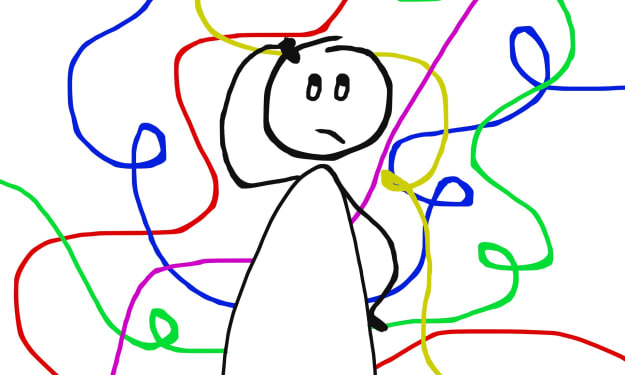The Unique Struggles of Being a Writer with Bipolar Disorder
When there’s too many or not enough words.

To be a writer, you have to be a little off. Maybe it’s why so many writers also have a mental illness. Or perhaps having bipolar disorder may inspire you to become a writer.
I can’t be certain of this one.
What I can tell you is what it’s like to be a writer with bipolar disorder.
Just like everything else in life, bipolar makes the world of writing an adventurous place. Typically, I’m in one of three phases. What follows summarizes the unique struggles of being a writer with bipolar disorder.
I can write everything
Bipolar disorder is best known by its two cycling episodes of mania and depression. While you live most days somewhere in between, the two extremes can hit without warning and with a vengeance.
In my experience, you don’t have to be near either extreme for bipolar to affect your writing.
On the one hand, you have mania. Inspiration is plentiful and words fill your head.
Ideas will fly at me with such ferocity that I can hardly write them fast enough. My blog topics folder has over 100 ideas of projects I want to write. My drafts folder has nearly as many partially completed drafts.
The days when the ideas are flowing, I might write 10,000 words or start 15 different articles. It’s also the time I decide I have to publish on every site from Vocal and NewsBreak, to my blog and Medium. Those are the good days of being a writer with bipolar disorder.
Mania always brings its evil twin: depression. This is what happens with the depressive cycle.
I can write nothing
The depressive side of bipolar disorder brings all writing to a stop. It’s not that the ideas completely go away, but suddenly you don’t know how to put them together.
Not only does motivation disappear, but so does your willingness to put in the effort. You may simply not care about writing or your readers.
Yes, that’s a harsh truth, but it’s a reality. Bipolar depression can take away all emotion and enthusiasm. Nothing feels like it matters, so all production stops.
Don’t get me wrong, I love my readers. I’m thankful for every one of you. On bad days, though, that’s a hard thing to remember.
With the extreme periods out of the way, you might think the remaining days would be easy to write. Yet, being a writer with bipolar disorder includes one more variable.
It’s something I like to call bipolar blur, but many with chronic illnesses call a similar phenomenon brain fog.
What is writing?
“Bipolar blur” is my term for the days when the world is a swirling haze around you. I wrote the poem, Bipolar Blur, to describe how it feels.
For me, this fog can appear both during a manic and a depressive episode and at any time in between.
For whatever reason, your brain turns off. Writing becomes an alien concept. There are no words to write even if you want to.
Those are the days you struggle to remember how to tie your shoes or turn on the television. The art of writing becomes a foreign language you’ve never heard before. There’s almost no way to produce anything while in the grasp of those days.
Since being a writer with bipolar disorder has so many obstacles, is there anything you can do? Absolutely.

Just keep writing
When coping with mental illness, it’s vital you constantly keep fighting. The battle never ends, so you must never quit.
Writing is the same. The only way to be a successful writer is to exercise your writing muscles. You must keep creating content. That’s true if you have a mental illness or not.
Keep putting words on paper, no matter how incoherent they might be. Not everything is for the world to see, and that’s perfectly okay.
On the foggy days when there are no words and you don’t know how to type or hold a pen, then try audio files. Open a talk-to-text app on your phone and start talking.
The words don’t have to make sense, and you don’t have to do it for a long time. Even five minutes will keep your creative brain nourished. This will make it much easier to write the next time your brain is willing to cooperate with you.
In the last few weeks, I have cycled rapidly through all three phases of writing mayhem. Too many words, no words, and a vague recollection of the meaning of words have all stopped me.
I care about my readers and my art. So, here I am again, sitting and writing. You can do it too.
Until next time, keep fighting. (And writing.)
***
If you enjoyed this article, you’ll love my free Sunday newsletter about all things bipolar. Sign up now!
Let's also connect on social media.
About the Creator
Scott Ninneman
Bipolar for 49 years, chronically ill for 36. The voice behind the Speaking Bipolar blog. Wrestles taxes by day, wrangles words at night. Thinker. TV Addict. Poet. Links: https://speakingbipolar.com/socialmedia






Comments
There are no comments for this story
Be the first to respond and start the conversation.